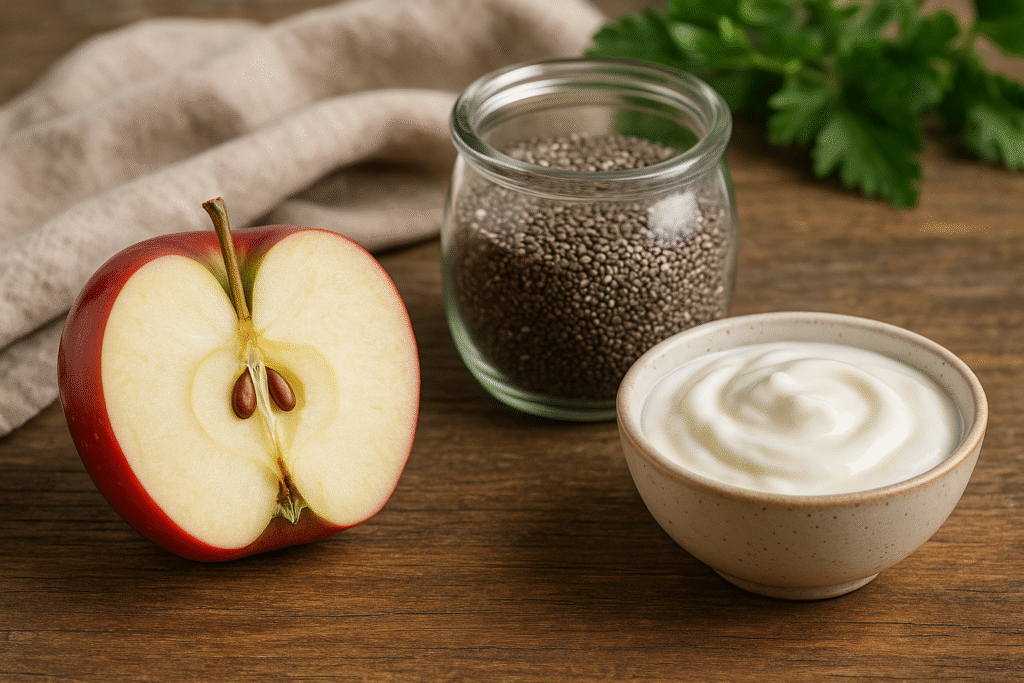You’ve heard the old saying: “An apple a day keeps the doctor away.” But is there any truth behind this popular phrase? As it turns out, there’s more than just folklore at play—science supports the idea that apples offer a wealth of benefits when consumed regularly. From improving digestion to enhancing heart health and boosting immunity, the simple apple may be one of nature’s most powerful daily habits.
In this article, we’ll uncover exactly what happens to your body when you eat an apple every day. Whether you’re looking to improve your diet, support weight loss, or maintain long-term wellness, this humble fruit might be a game-changer. Let’s bite into the facts and see why apples truly deserve their reputation as a daily essential.
The Nutritional Powerhouse Inside Every Apple
A Compact Source of Daily Nutrients
Apples may seem like a simple snack, but under that crisp skin lies a complex nutritional profile. One medium-sized apple (about 200 grams) contains:
- 95 calories
- 4 grams of fiber
- 19 grams of natural sugars
- 14% of the daily value (DV) for Vitamin C
- 6% DV for potassium
- Antioxidants like quercetin, catechin, and chlorogenic acid
These nutrients support several bodily functions—from collagen production and immune defense to blood pressure regulation and oxidative stress reduction.
💡 Quick Tip
To maximize the antioxidant content, always eat apples with the skin on—it contains up to half of the fruit’s total polyphenols.
Fiber’s Role in Digestion and Satiety
Apples are rich in both soluble and insoluble fiber, notably pectin. Soluble fiber helps slow down digestion, promoting a feeling of fullness—making it an ideal snack for weight management. Insoluble fiber, on the other hand, adds bulk to stool, supporting regular bowel movements and reducing the risk of constipation.
Studies show that diets rich in fiber can lower the risk of type 2 diabetes, cardiovascular disease, and certain types of cancer, according to the National Institutes of Health.
Natural Sugar with a Healthy Twist
Though apples contain about 19 grams of sugar, it’s important to note these are natural sugars paired with fiber. This means slower absorption and less impact on blood sugar compared to processed snacks. In fact, eating whole apples has been linked to improved blood glucose control in prediabetic individuals.
✅ Expert Summary
A daily apple provides essential vitamins, minerals, fiber, and antioxidants. This combination supports energy, gut health, and immune function—all while keeping your calorie intake low.
Apples and Your Immune System: Building Natural Defense
Vitamin C—The Immune-Activating Antioxidant
One of the standout nutrients in apples is Vitamin C, a powerful antioxidant that plays a vital role in your immune response. It supports the production and function of white blood cells, which fight infections and reduce inflammation. Even though apples aren’t the richest source of Vitamin C compared to citrus fruits, eating one daily still contributes meaningfully to your needs.
A 2022 review published in Nutrients found that consistent, moderate intake of Vitamin C from whole foods improves resistance to respiratory infections and supports quicker recovery.
Polyphenols—Silent Guardians Against Inflammation
Apples are exceptionally rich in polyphenols, including flavonoids such as quercetin, epicatechin, and phloridzin. These compounds have been shown to reduce systemic inflammation, which is often the root cause of chronic diseases.
In particular, quercetin—found abundantly in apple skin—has been researched for its antiviral and anti-inflammatory properties. One study published in Frontiers in Immunology demonstrated that quercetin supplementation significantly reduced inflammation and oxidative stress in human subjects.
📌 Did You Know?
Apples contain over 1,000 different plant compounds. Many of these interact synergistically to protect your cells from damage caused by viruses, bacteria, and environmental toxins.
Gut-Immune Axis: Feeding the Friendly Flora
Your immune system is deeply connected to your gut microbiome—and apples help nourish it. Thanks to their high pectin content, apples act as a prebiotic, feeding beneficial bacteria such as Bifidobacteria and Lactobacillus. These microbes support healthy immune responses, regulate inflammation, and even influence mood and brain function.
A 2020 study from the American Journal of Clinical Nutrition found that daily consumption of apples improved microbial diversity and increased the presence of anti-inflammatory gut bacteria within just four weeks.
Apple Variety and Immune Benefits
| Apple Variety | Antioxidant Strength | Vitamin C Content | Polyphenol Concentration |
|---|---|---|---|
| Red Delicious | High | Moderate | Very High |
| Granny Smith | Moderate | High | Moderate |
| Fuji | Moderate | Low | Moderate |
| Gala | Moderate | Moderate | High |
Caption: Not all apples offer the same health benefits—some are richer in antioxidants and Vitamin C.
How Eating Apples Daily Supports Heart Health
Cholesterol Management Through Soluble Fiber

One of the most researched heart benefits of apples lies in their ability to lower LDL cholesterol—often referred to as “bad cholesterol.” The pectin found in apples binds to cholesterol in the digestive tract, reducing its absorption and helping lower LDL, as noted by Healthline.
A 2020 randomized controlled trial published in The American Journal of Clinical Nutrition revealed that participants who consumed two apples daily for eight weeks saw a reduction of LDL cholesterol by 3–4%—a modest but clinically relevant change.
💡 Quick Tip
Pairing apples with a small serving of almonds or walnuts enhances their heart-protective effects, thanks to the synergistic role of healthy fats and fiber.
Blood Pressure and Vascular Health
Apples are a source of potassium, an essential electrolyte that helps regulate blood pressure. By promoting vasodilation (the widening of blood vessels), potassium supports healthier circulation and reduces stress on the arterial walls.
In addition, apple polyphenols such as epicatechin improve endothelial function, enhancing blood flow and reducing arterial stiffness—two markers linked to a lower risk of cardiovascular events.
Antioxidants That Guard the Heart
Oxidative stress plays a key role in the development of atherosclerosis, or the buildup of plaques in arteries. The antioxidant compounds in apples—especially procyanidins—help neutralize free radicals that damage blood vessels.
Research from the European Journal of Nutrition showed that individuals with high apple intake had a 20% reduced risk of stroke over a 10-year period compared to non-apple eaters.
✅ Expert Summary
Daily apple consumption supports heart health by lowering LDL cholesterol, improving circulation, and providing antioxidants that protect blood vessels from oxidative damage.
Daily Apples and Digestive Wellness: What You Should Know
Fiber Synergy—Fuel for a Healthy Gut
Each apple delivers about 4 grams of dietary fiber, with a unique balance of soluble (pectin) and insoluble types. Soluble fiber dissolves into a gel-like substance in the gut, helping slow digestion and regulate blood sugar, while insoluble fiber adds bulk and supports intestinal transit.
But what makes apples special is how pectin acts as a prebiotic, selectively feeding beneficial gut bacteria. This encourages microbial diversity and helps suppress harmful strains, balancing the gut microbiome—a crucial regulator of digestion and immunity.
📌 Did You Know?
Your gut produces over 90% of your body’s serotonin—meaning a healthy microbiome, supported by foods like apples, could improve your mood and mental well-being too.
Regularity and Natural Relief from Constipation
Apples, especially when eaten raw with the peel, are one of the most effective natural remedies for constipation. A study published in Food & Function showed that regular apple intake improved bowel movement frequency and stool consistency in adults suffering from mild to moderate constipation.
This is partly due to the cellulose and hemicellulose fibers in the skin, which add bulk and trigger peristalsis—the wave-like muscle contractions that move food through your intestines.
pH Balance and Bloating Reduction
Despite their mildly acidic nature, apples can help regulate overall gut pH due to their alkalizing effect once metabolized. This can reduce symptoms of indigestion, such as bloating, and promote better enzyme activity during digestion.
In particular, Granny Smith apples have been found to promote short-chain fatty acid (SCFA) production, which reduces intestinal inflammation and improves nutrient absorption.

Gut-Healthy Apple Pairings
| Apple Pairing | Digestive Benefit | Additional Nutrients Provided |
|---|---|---|
| Apple + Greek yogurt | Probiotic + Prebiotic synergy | Calcium, Protein |
| Apple + chia seeds | Enhanced fiber and omega-3s | Omega-3s, Lignans |
| Apple + ginger tea | Bloating relief and motility | Anti-nausea, Anti-inflammatory |
Caption: Combine apples with gut-supportive foods for enhanced relief from bloating, constipation, and sluggish digestion.
What the Research Says Happens When You Eat an Apple Every Day
Apples and Cancer Risk Reduction
Numerous population studies have associated regular apple consumption with a lower risk of several types of cancer, including colorectal, lung, breast, and digestive tract cancers.
A meta-analysis published in Public Health Nutrition analyzed data from over 40 studies and concluded that individuals who consumed at least one apple per day had a 20–25% reduced risk of developing colorectal cancer compared to those who did not consume apples regularly.
Researchers believe this effect stems from apple polyphenols, particularly phloridzin and chlorogenic acid, which possess antioxidant and antiproliferative properties—slowing the growth of cancerous cells and promoting apoptosis (programmed cell death).
Type 2 Diabetes: Stabilizing Blood Sugar Naturally
Despite their sugar content, apples have a surprisingly low glycemic index (around 36) thanks to their fiber, polyphenols, and slow-digesting carbohydrate matrix.
A longitudinal study published in The British Medical Journal found that people who ate at least three servings of apples per week had a 7% lower risk of developing type 2 diabetes, independent of other lifestyle factors.
Polyphenols in apples reduce glucose absorption in the intestines, improve insulin sensitivity, and support the pancreas in regulating glucose levels more efficiently.
💡 Quick Tip
For best glycemic control, eat apples with some protein (like cheese or nut butter) to slow digestion and further stabilize blood sugar levels.
Cognitive Protection and Brain Health
Recent research is beginning to uncover how apples can help protect the brain from age-related decline. A study published in Nutrients demonstrated that apple flavonoids improve cognitive performance, reduce oxidative stress in neural tissue, and may delay the onset of neurodegenerative disorders such as Alzheimer’s.
In animal models, the quercetin found in apples was shown to reduce neuronal inflammation, preserve brain cell structure, and enhance spatial memory. While more human trials are needed, early data are promising and suggest daily apples could be part of a neuroprotective diet.
✅ Expert Summary
Scientific studies support that daily apple intake may reduce the risk of chronic diseases including cancer, diabetes, and cognitive decline—thanks to their rich antioxidant, anti-inflammatory, and blood sugar-stabilizing compounds.
Conclusion
Eating an apple every day isn’t just an old saying—it’s a proven strategy for better health. From improving digestion and supporting heart function to strengthening your immune system and possibly reducing the risk of chronic diseases, apples are a low-cost, high-reward addition to your daily routine.
Backed by science and supported by generations of nutritional wisdom, this humble fruit offers profound effects with minimal effort. So the next time you’re reaching for a snack, remember: one apple a day really can help keep more than just the doctor away.
Main Takeaways
- Apples deliver essential nutrients like fiber, Vitamin C, and antioxidants in just 95 calories.
- They promote digestion and gut health by feeding good bacteria and relieving constipation.
- Daily apple intake improves heart health by lowering LDL cholesterol and blood pressure.
- Their polyphenols may reduce the risk of cancer, type 2 diabetes, and neurodegenerative diseases.
- Apples are a powerful, natural, and affordable health ally—especially when eaten with the skin.



